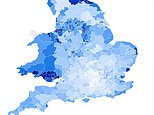
Almost one in 20 working-age adults get disability benefits for depression or anxiety in parts of England and Wales, figures suggest.
MailOnline analysis of Britain’s spiralling PIP bill names Labour-run constituencies of Liverpool Walton, Blaenau Gwent and Rhymney, and Merthyr Tydfil and Aberdare as the hotspots.
PIP handouts for mental health claims have hit an all-time high, doubling over the last decade.
Under pressure to save taxpayers billions, Labour has vowed to tighten the eligibility criteria. Critics fear the biggest disability benefit, which takes up more than £21bn of the UK’s welfare budget, is too easy to exploit.
However, Sir Keir Starmer last week humiliatingly U-turned on his flagship reforms – set to be voted on today – in the face of a disastrous internal rebellion.
More than 120 Labour MPs threatened to kill the plans, which ministers hoped would save around £5bn by the end of Parliament.
Labour has since promised no health or disability claimants will be worse off, though Sir Keir’s backtracking has sparked fears of tax rises this autumn to plug lost savings worth around £2.5bn.
Latest DWP statistics show 3.7million people in England, Wales and Northern Ireland currently receive PIP. This is up from around 2m before Covid struck.
MailOnline analysis of those DWP figures last week found nearly a third of working-age adults currently get PIP in parts of England.
Residents in the hotspot – the Victoria Park district of Plymouth – said they were sick of seeing their taxes abused.
Our new analysis, presented in an interactive map, looks solely at primary PIP claims down to depression or anxiety.
Therefore, it doesn’t include people with mental health issues who are receiving the payments for other conditions, such as arthritis.
When looking at the DWP data this way, both conditions now make-up almost 17 per cent of all PIP handouts.
Half of the top ten highest-claiming constituencies fall in or around the Welsh valleys.
The top spot, however, goes to Liverpool Walton – a Labour constituency since 2017, home to Everton’s Goodison Park and Liverpool Anfield (4.7 per cent).
It amounts to over 20 per cent of the total PIP claimants for that area, which number nearly 15,000.
Blaenau Gwent and Rhymney (4.6 per cent) comes second followed by its neighbour Merthyr Tydfil and Aberdare (4.4 per cent).
Across these Welsh regions, home to around 120,000 people, over 5,000 adults claim PIP for anxiety and depression.
Easington in County Durham and Aberafan Maesteg (both 4.4 per cent) rounded out the top five.
For our analysis, working-aged adults were classed as anything between 16 and 64.
Anyone with a long-term physical or mental health condition or disability that affects their day-to-day life can get PIP, including adults in full-time employment.
PIP is split into two parts and claimants can be eligible for both. The daily living part goes to adults needing help with everyday tasks, whereas the mobility part is doled out to those who require assistance getting around.
Whether they get one or both parts and how much they get depends on how difficult they find everyday tasks and getting around.
Anyone nearing the end of life such as from a life-limiting illness will automatically get the daily living part – but the mobility part depends on their needs.
Adults undergoing PIP assessments are scored on a scale of zero to 12 – based on how difficult they find everyday tasks such as preparing and eating food.
Currently, someone who receives between eight and 11 points in total gets the daily living part of PIP at a standard rate, worth £73.90 per week.
If they get at least 12 points, they get the daily living component at an enhanced rate, worth £110.40 a week.
Labour’s original bill proposed to introduce a higher bar for eligibility for the handout, and cut the health-related element of universal credit.
Simon Cook, data analyst of the TaxPayers’ Alliance, said: ‘It’s clear from this data and from the data we’ve published that something has gone horribly wrong with the UK’s benefits system.
‘The explosion in the number of people claiming for psychiatric disorders is undoubtedly driven partly by better diagnosis and greater respect for mental health conditions.
‘But the scale of the increase surely demonstrates it’s far more than just that.
‘MPs from across the spectrum should be looking at this and recognising that something seriously needs to change, and that requires an honest conversation about making eligibility stricter.’










